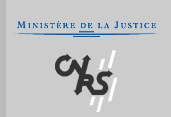



| |
|
|
|
|
|
|
|
|
|
|
|
|
|
|
|
|
|
|
||||||
| |
 |
|
||||||||||||||||||||||
| |
 |
 |
|
 |
|
|||||||||||||||||||
| |
|
|
|
|
||||||||||||||||||||
| |
|
|
|
|||||||||||||||||||||
| |
|
|||||||||||||||||||||||
| |
|
|||||||||||||||||||||||
| |
||||||||||||||||||||||||
| |
|
|
|
|||||||||||||||||||||
| |
|
|||||||||||||||||||||||
 |
Membres du CESDIP habilités à diriger des recherches (HDR) |
 |
Le programme de recherches du CESDIP pour la période 2006-2007 |
 |
Réseau thématique de l’Association Française de Sociologie (AFS) |
|
|
|||||
 |
|
COMBATTING MONEY LAUNDERING AT THE EUROPEAN LEVEL
par Peter HÄGEL, Peter HÄGEL, a political scientist and a doctoral fellow at the Social Sciences Department of the Berlin Humboldt University, has spent time at the CESDIP during Spring 2003, as a participant to the Associated European Laboratory "Crime and Policies of Safety and Prevention : French-German Comparative Research". His work bears upon a comparison of European policies of control and regulation of persons’ and financial flows. He is reflecting on the ten-year old struggle against money laundering at the European level as well as on criminal law harmonisation.
1. A new law enforcement approach in the European Union Throughout the last two decades, the European Union (EU), via the Schengen Conventions (1985-1990) and the Treaties of Maastricht (1992), Amsterdam (1997) and Nice (2001), is developing into what is called a common "area of freedom, security, and justice". During the same period, a new approach against profit-driven crimes has spread around the world, the fight against money laundering2 Its logic is to lower the incentives for such crimes by taking away the profits with a combination of three methods : (1) criminalising money laundering, the transformation of proceeds of crime into seemingly legitimate income or assets ; (2) preventive regulatory controls for private financial and non-financial institutions in order to deter and detect money laundering, and the setting-up of public Financial Intelligence Units which receive reports on suspicious transactions from the private sector for analysis and the decision whether to pass them on to law enforcement ; and (3) laws that allow for the confiscation of proceeds of crime.
|
||||
|
mars 2007 PRISON ENTRIES AND LENGTH OF DETENTION. THE DIVERSITY OF THE CORRECTIONAL SYSTEMS SITUATION IN EUROPE janvier 2007 VICTIMISATION AND POLICE STATISTICS IN THE ÎLE-DE-FRANCE REGION décembre 2006 VICTIMIZATION AND INSECURITY IN URBAN AREAS. THE 2005 SURVEYS septembre 2006 VIOLENCE IN PRIMARY SCHOOLS, AS EXPERIENCED BY TEACHERS AND PUPILS juin 2006 RELATIVITY OF AND GAPS IN SOURCES OF STATISTICS ON PRETRIAL DETENTION janvier 2006 SOME ASPECTS OF VIOLENCE IN SOCIAL RELATIONS DELIBERATE ASSAULT AND BATTERY ENTAILING INCAPACITY TO WORK TRIED BY A PARIS AREA CORRECTIONNEL COURT IN THE YEAR 2000 décembre 2005 SITUATIONAL CRIME PREVENTION IN PUBLIC HOUSING : LETTER FROM AMERICA septembre 2005 PSYCHOLOGICAL EXPERTISE, RISK MANAGEMENT AND POWER RELATIONS IN CANADIAN PRISONS juin 2005 A COMPARATIVE STUDY OF PRISON LABOUR IN FRANCE, GERMANY AND ENGLAND mars 2005 WHEN THE POLICE GO TO COURT. A STUDY OF CONTEMPT, OBSTRUCTION AND ASSAULT ON A POLICE OFFICER janvier 2005 A RESEARCH ON GANG RAPE CASES : JUDICIAL DATA AND SOCIOLOGICAL ANALYSIS décembre 2004 PREVENTIVE POLICY FOR DRUG USERS : STRAINED NORMS septembre 2004 LEAVING SCHOOL, A NEW FORM OF JUVENILE DEVIANCE ? juin 2004 OF WHAT USE ARE LAWYERS FOR JUVENILE OFFENDERS ? mars 2004 IMPOSSIBLE INTERNATIONAL COMPARISONS OF STATISTICS ? THE EUROPEAN SOURCEBOOK EXPERIENCE janvier 2004 CRIMINAL INVESTIGATIONS IN HOMICIDE CASES décembre 2003 FRENCH COURT CLERKS : UNCERTAINTIES IN TURNING THE JOB INTO A PROFESSION juin 2003 ELECTRONIC MONITORING : ASSESSMENT OF THE EXPERIMENTAL PHASE janvier 2003 THE CUSTOMS DEPARTMENT AS ACTOR ON THE CRIMINAL JUSTICE SCENE |
|